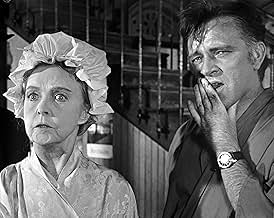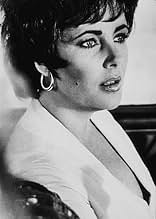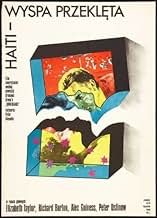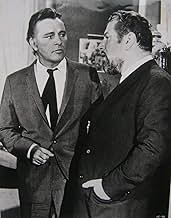Ein zynischer walisischer Hotelbesitzer treibt heimlich eine Romanze mit der Frau eines Diplomaten in Haiti, unter der gewalttätigen Herrschaft des Despoten "Papa Doc" Duvalier.Ein zynischer walisischer Hotelbesitzer treibt heimlich eine Romanze mit der Frau eines Diplomaten in Haiti, unter der gewalttätigen Herrschaft des Despoten "Papa Doc" Duvalier.Ein zynischer walisischer Hotelbesitzer treibt heimlich eine Romanze mit der Frau eines Diplomaten in Haiti, unter der gewalttätigen Herrschaft des Despoten "Papa Doc" Duvalier.
- Auszeichnungen
- 3 Gewinne & 1 Nominierung insgesamt
- Haitian Soldier
- (Nicht genannt)
- Haitian Soldier
- (Nicht genannt)
- Angelito Pineda
- (Nicht genannt)
- César
- (Nicht genannt)
Empfohlene Bewertungen
The great storyteller that he was, Graham Greene must have woven the elements of this story together very well in his novel. But here we have two big separate stories butting heads with one another. The first is the adulterous love affair between the two leads, Richard Burton as Brown and Elizabeth Taylor as Martha. The second is the plight of the people of Haiti living in a constant state of terror under the ruthless Duvalier and his henchmen. But then, two other elements that Greene no doubt worked into his single story, here appear to be separate stories awkwardly sandwiched into the two main stories. They are the businesses of Major Jones, played by Alec Guinness, and of Smith, played by Paul Ford. The end result is a plot with many subplots – all poorly connected.
Besides the leads, the film has several stellar actors. Guinness and Ford are joined by Peter Ustinov as Ambassador Pineda, Lillian Gish as Mrs. Smith, and James Earl Jones as Dr. Magiot. A handful of others in the supporting cast also give good performances in the film.
The direction and editing are weak. The cinematography is good and the location does a good job showing the scenery and conditions as they might have been in Haiti from the late 1950s through most of the 20th century. But for that historical connection and the performances of the supporting cast, this film is hardly worth watching. At the end of the movie, it seemed to me that I had been watching a belabored story about a sex-driven but frustrated white hotel owner in Haiti who couldn't find fulfillment in anything he did.
Movie fans who enjoy history may find Duvalier's story interesting. He was a physician who treated the poor and suffering people of Haiti in his early life. That's where he got his endearing moniker from the people, "Papa Doc." He was elected president in a free open election in 1957. But he soon became crazed with power. He killed 30,000 of his countrymen and established a reign of fear and terror, while the poor of his country suffered all the more.
Graham Greene does a respectable job of paring down his complex novel for the screen, and director Glenville keeps the film moving at a reasonable pace in spite of its lengthy runtime of 150 minutes. The film is always interesting and occasionally gripping, although Greene and Glenville keep the audience at a relative distance which prevents the picture from striking as hard as it could have. Burton is in good form, and Alec Guinness, Paul Ford, and Lillian Gish all turn in top notch support (only Peter Ustinov feels under utilized). Unfortunately, Taylor is dreadfully miscast as a German military wife complete with a woefully unconvincing accent and her ill-fitting presence creates several lulls in the film as the number of scenes between her character and Burton's character are increased (in order to give the diva her proper screen time) which hampers a few long stretches of the film and slightly undermines what could have been a first-rate effort.
Set during the time of Papa Doc, the story centers on Richard Burton as the white owner of a hotel left to him by his mother. He is in love with the wife (Elizabeth Taylor) of an ambassador (Peter Ustinov) and has managed to remain apolitical. However, events force him to enter the fray.
The Comedians holds one's interest, although it's on the long side. The cast is remarkable: Burton, Alec Guinness, Peter Ustinov, Taylor, James Earl Jones, Lillian Gish, Georg Stanford Brown, Roscoe Lee Brown, and, in a small role, Cicely Tyson.
Taylor is very beautiful, although her accent is all over the place. She sounds French in the beginning, then English, then like Elizabeth Taylor, and then in the middle of the movie, we find out she's German.
Though Burton went the schlock for cash route in his career, he was a wonderful, handsome actor with a remarkable voice. Towards the end of the film, he has a scene with Guinness that is well worth the wait - two great actors in a subdued and remarkable scene.
The Haitian scenery belies what lies underneath. It's a film that is perhaps more timely today than it was in 1967.
The still ravishing Taylor, who affects a German-accent as the wife of Ustinov, a cuckolded foreign ambassador, is involved with Burton, a local hotel owner. While arguably the least-interesting aspect of the film, their liaison is integral to the story. Meanwhile, Paul Ford and his wife, Gish, seek to establish a vegetarian center in Duvalierville, a never-will-be Utopian community, and a shady braggart with the wrong connections, Guinness, attempts an arms sale to Duvalier's henchmen. The visitors, the diplomats, and their local connections are embroiled in Haitian political conflicts and dangerous encounters with Duvalier's thugs, the dreaded Tonton Macoute.
Greene's script is literate, and the performances are effective. The bevy of international stars is enhanced and ably supported by such pros as Paul Ford, Cicely Tyson, Raymond St. Jacques, Roscoe Lee Browne, and George Stanford Brown. Although short on action, "The Comedians" is long on suspense and tension. While the film certainly remains a staple for fans of Taylor and Burton, Glenville's fine production deserves to be seen and appreciated, not only for its lustrous stars, but also for throwing a spotlight on Haiti's nightmarish past.
Wusstest du schon
- WissenswertesSeveral critics noted that the ending of this movie is at least a little more positive and optimistic than the bleak ending of Graham Greene's original novel, and attacked the movie for "softening" the subject. Graham Greene, however, insisted that the more upbeat ending had been his own idea.
- PatzerIn the last few shots in the movie, as the Character is leaving the airport, there is initially a departing Vickers VC10 airliner flying overhead from right to left, this changes to a close up, followed by a shot of the same airliner now flying into the distance - unfortunately this is different 4 engine Jetliner, probably a Boeing 707.
- Zitate
Brown: I don't believe in causes.
Dr. Magiot: The role of cynic doesn't really suit you, Brown.
Brown: I don't believe in play-acting either.
Dr. Magiot: You imagine because you've lost one faith, you've lost all? You're wrong, Brown. There is always an alternative to the faith we lose.
Brown: I have no faith in faith.
- VerbindungenFeatured in Die Komödianten in Afrika (1967)
Top-Auswahl
- How long is The Comedians?Powered by Alexa
Details
- Erscheinungsdatum
- Herkunftsländer
- Sprachen
- Auch bekannt als
- The Comedians
- Drehorte
- Produktionsfirmen
- Weitere beteiligte Unternehmen bei IMDbPro anzeigen
Box Office
- Bruttoertrag in den USA und Kanada
- 5.200.000 $
- Laufzeit
- 2 Std. 30 Min.(150 min)
- Sound-Mix
- Seitenverhältnis
- 2.35 : 1



































